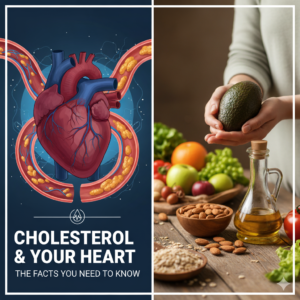-
+ 91 75 75957595+ 91 75 75957595
-
drgeethika.amara@gmail.comdrgeethika.amara@gmail.com
Cholesterol is a word that often sparks concern, but it is actually an essential part of the human body. This fat-like substance helps build cell membranes, supports hormone production, and plays a role in making vitamin D. Trouble begins only when cholesterol levels become too high or out of balance, which increases the risk of heart disease and other serious health conditions.

Cholesterol travels in the blood through carriers called lipoproteins. Low-Density Lipoprotein (LDL) is often labeled the “bad” type because it can stick to artery walls, narrowing them and slowing blood flow. High-Density Lipoprotein (HDL) is known as the “good” type since it works to collect extra cholesterol from the bloodstream and carry it back to the liver for disposal. The right balance—lower LDL and higher HDL—keeps your heart healthier.
High cholesterol does not usually cause obvious symptoms. Many people are unaware of it until they develop complications. Over time, excess LDL can form hard deposits, known as plaques, which reduce the flexibility of arteries. This process, called atherosclerosis, raises the chances of high blood pressure, heart attack, or stroke. Regular medical checkups are the only reliable way to detect the problem early.
Several factors influence cholesterol levels. Eating foods rich in saturated and trans fats, living a sedentary lifestyle, being overweight, or smoking all increase the likelihood of high cholesterol. Excessive alcohol use is another contributor. Family history and aging also play a role, which means even people who follow healthy habits can still be at risk.
The good news is that cholesterol can be managed and reduced through everyday choices. A diet centered on fruits, vegetables, whole grains, lean proteins, and healthy fats like nuts or olive oil helps improve cholesterol balance. Regular physical activity boosts circulation and promotes higher HDL levels. Quitting smoking, keeping alcohol intake moderate, and maintaining a healthy body weight also support heart health. In some cases, doctors may recommend medication, but lifestyle adjustments are always the foundation of treatment.
Cholesterol itself is not harmful—it is necessary for normal body function. The real issue lies in having too much of the wrong type. By adopting healthier habits, getting routine checkups, and seeking medical advice when needed, you can keep cholesterol under control and safeguard your heart for the long term.
Dr. Geethika’s Clinic in Jubilee Hills provides compassionate, personalized care, specializing in chronic conditions, preventive health, wellness, and nutrition.
Copyright © 2024 DR. GEETHIKA’S CLINIC – All Rights Reserved.
Designed & Developed by Galaxy Tech Solutions
WhatsApp us